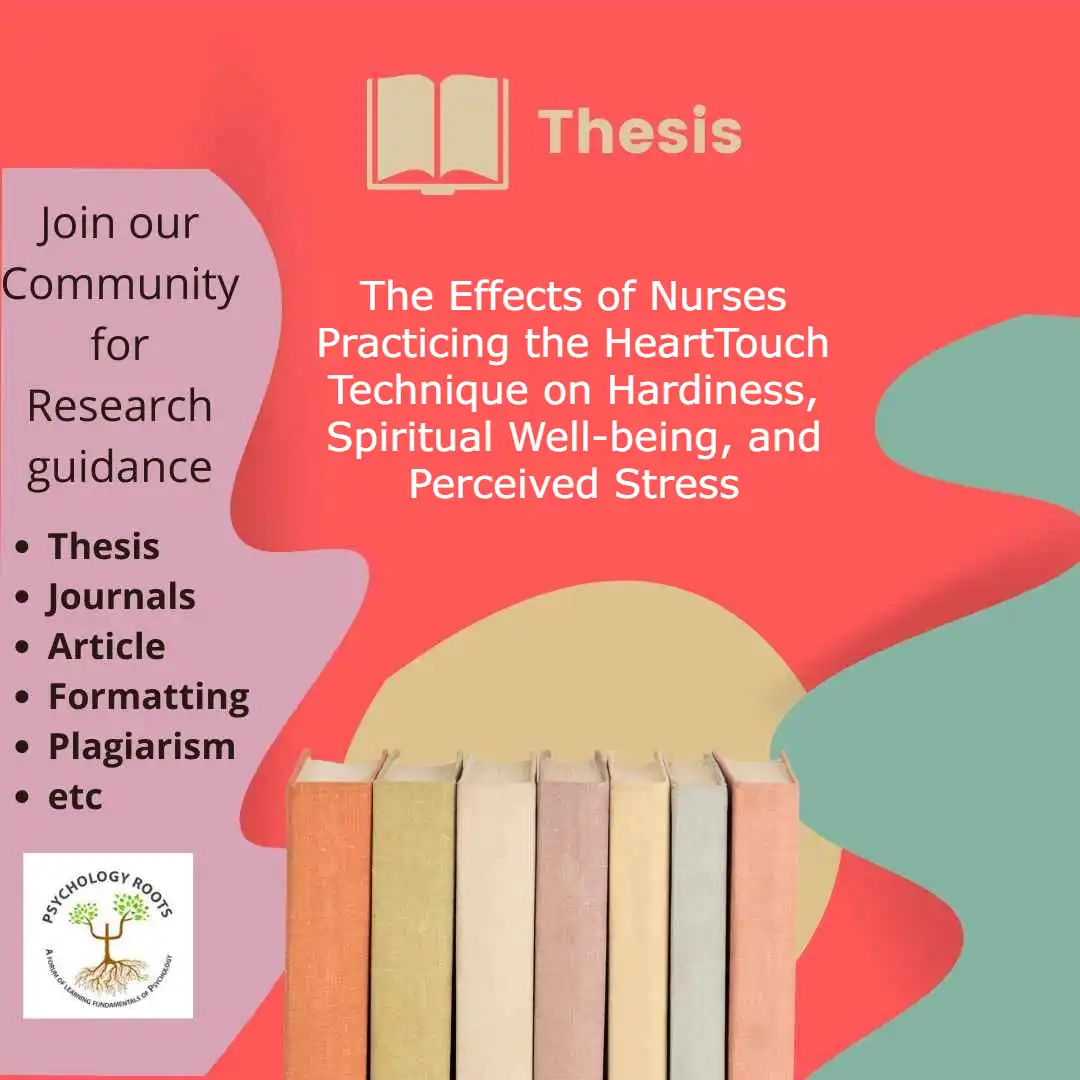Table of Contents
The Effects of Nurses Practicing the HeartTouch Technique on Hardiness, Spiritual Well-being, and Perceived Stress
Here in this post, we are sharing the full Psychology thesis on “The Effects of Nurses Practicing the HeartTouch Technique on Hardiness, Spiritual Well-being, and Perceived Stress“. You can read the abstract of the thesis with a download link. We have thousands of thesis in our collection (See articles). You can demand us any article related to psychology through our community, and we will provide you within a short time. Keep visiting Psychology Roots.
Abstract of the thesis
This quasi-experimental study was conducted to test the effects of nurses practicing the HeartTouch technique on hardiness, spiritual well-being, and perceived stress, as compared to the comparison group who did not practice the HeartTouch technique. The HeartTouch technique is a brief, internal maneuver designed to help the nurse notice and change thoughts and feelings, and can be practiced during daily activities.

The Effects of Nurses Practicing the HeartTouch Technique on Hardiness, Spiritual Well-being, and Perceived Stress
This study supported Martha Rogers’ nursing paradigm, the Science of Unitary Human Beings. Instruments used to measure the outcome variables included the Dispositional Resilience Scale to measure hardiness, the Spiritual Well-being Scale to measure spiritual well-being, the Perceived Stress Scale to measure stress, and the HeartTouch Questionnaire to assess nurses’ experience of practicing the HeartTouch technique. Participants included female RN’s, 58 in the experimental group and 40 in the comparison group, employed in the hospital setting. The nurses were primarily Caucasian and from many different nursing specialties.
Due to the quasi-experimental nature of the investigation and some pretest differences, the pretest scores were treated as covariates and a series of analyses of covariance (ANCOVA) was performed to compare the experimental and comparison groups on each of the adjusted posttest scores. Although there were no statistically significant results, all means were in the expected directions with the improvement in the experimental group greater than the comparison group on all variables.
To assess practical significance of the findings, were computed for each outcome variable, ranging from .14 to .35, with Perceived Stress, d=.14, Hardiness, d=.21, and Spiritual Well-being=.32. The effect sizes obtained in this study suggested that nurses who practiced the HeartTouch technique would most likely notice a decrease in their perceived stress and an increase in their spiritual well-being and hardiness compared to nurses who did not practice the technique. The qualitative data in this study supported the practical significance of practicing the HeartTouch technique, with nurses reporting various mental, emotional, and spiritual benefits in their work and home life, including decreased stress and increased control and meaningful connection with others and Higher Power.
Researcher of the Thesis
- Marsha Jelonek Walker
Avail Thesis [sociallocker id=64051]
[/sociallocker]
Need help in Research:
Are you struggling in research? Don’t Worry, We provide you with complete guidance and support free and quickly. Just need to create a query in our community. We also offer paid services such as:
- Thesis writing
- Article writing
- Statistical analysis
- Reference according to APA
- APA Formatting
- Supervisions
- Courses and Training
Contact us for the best quality free and paid services. info@psychologyroots.com or (+92-3336800644)
Information:
The purpose of our website is only to help students to assist them in finding the best suitable instrument for their research, especially in Pakistan where students waste a lot of time in search of the instruments. It is totally free of cost and only for creating awareness and assisting students and researchers for good research. Moreover, it is necessary for you to take the permission of scales from their representative authors before use because copyrights are reserved by the respected authors.
Help Us Improve This Article
Did you find an inaccuracy? We work hard to provide accurate and scientifically reliable information. If you have found an error of any kind, please let us know.
Add comment. we appropriate your effort.
If you have any scale or any material related to psychology kindly share it with us at psychologyroots@gmail.com. We help others on behalf of you.
Follow